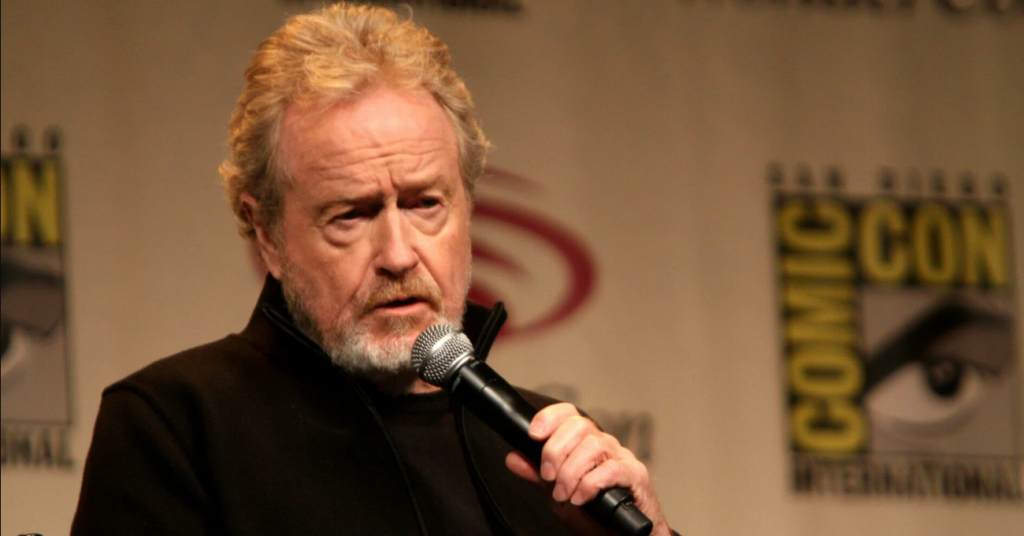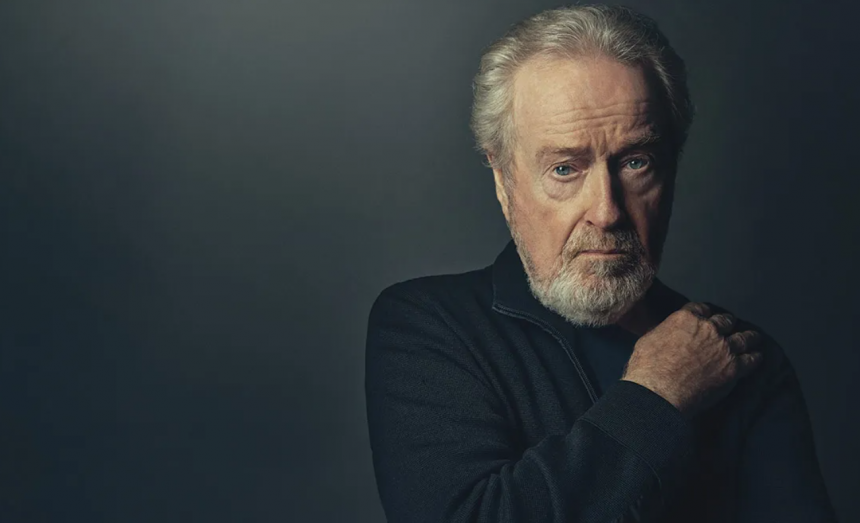Introduction
Sir Ridley Scott is one of the most influential filmmakers of all time. From Alien to Gladiator and Blade Runner, his films have not only entertained audiences worldwide but also shaped entire genres. His distinctive visual storytelling, mastery of atmosphere, and ability to handle epic-scale productions make him a unique figure in cinema history. Even at 87, he remains one of the most active and ambitious directors in Hollywood.
This article takes a deep dive into Ridley Scott’s extraordinary career, his impact on cinema, and his future projects.
Early Life and Education

Born on November 30, 1937, in South Shields, England, Ridley Scott grew up in a military family. His father was an officer in the Royal Engineers, which meant the family moved frequently during his childhood. This nomadic lifestyle exposed him to different cultures and landscapes, something that would later influence his visual style as a filmmaker. (Source)
Scott developed an interest in the arts at an early age and attended the West Hartlepool College of Art. He later enrolled at the prestigious Royal College of Art in London, where he studied graphic design and filmmaking. During this time, he directed his first short film, Boy and Bicycle, starring his younger brother Tony Scott, who would later become a successful director himself. (Source)
The Rise in the Film Industry

After graduating, Scott joined the BBC, working as a set designer before transitioning into directing television episodes. However, he found television too limiting for his ambitions, so he left to form his own production company, Ridley Scott Associates (RSA), in 1968. The company specialized in commercials, and Scott became famous for his visually striking ads, such as the 1973 Hovis bread commercial, which is still considered one of the greatest ads in British history. (Source)
His experience in commercials gave him a strong foundation in visual storytelling, helping him transition to feature films.
Breakthrough with The Duellists (1977) and Alien (1979)
Scott’s debut feature film, The Duellists (1977), was a historical drama set during the Napoleonic Wars. Though it didn’t achieve massive commercial success, it won the Best Debut Film award at the Cannes Film Festival, establishing Scott as a promising director. (Source)

His big breakthrough came in 1979 with Alien, a sci-fi horror masterpiece. Scott’s unique approach to the film, combining gothic horror with futuristic elements, created a claustrophobic and terrifying atmosphere. The film introduced one of the most iconic characters in cinema history, Ellen Ripley, played by Sigourney Weaver. Alien became a massive success and is now considered one of the greatest sci-fi movies of all time. (Source)
Blade Runner (1982) – A Sci-Fi Classic Ahead of Its Time
After Alien, Scott directed Blade Runner, a film that redefined the cyberpunk genre. The movie, starring Harrison Ford, was initially a commercial failure but later gained a cult following.
Set in a dystopian future, Blade Runner explored themes of identity, artificial intelligence, and the nature of humanity. The film’s dark, rainy streets and neon-lit cityscapes were inspired by Metropolis (1927) and have influenced countless sci-fi films and video games, from The Matrix to Cyberpunk 2077. (Source)
Despite its initial lukewarm reception, Blade Runner is now regarded as one of the most important sci-fi films ever made.
Success in Historical Epics and Action Films
Thelma & Louise (1991)

Scott’s ability to tackle different genres was evident in Thelma & Louise (1991), a feminist road movie starring Geena Davis and Susan Sarandon. The film was both a commercial and critical success, earning Scott an Academy Award nomination for Best Director. (Source)
Gladiator (2000) – Reviving the Epic Genre

Perhaps Scott’s biggest achievement came with Gladiator (2000). Starring Russell Crowe, the film revitalized the sword-and-sandal genre, winning five Academy Awards, including Best Picture. The famous quote, “Are you not entertained?”, has since become legendary in pop culture. (Source)
Ridley Scott’s Later Career and Recent Works
Black Hawk Down (2001)
Scott’s war drama Black Hawk Down (2001) depicted the real-life Battle of Mogadishu. The film was praised for its realistic and intense battle sequences, earning Scott another Oscar nomination for Best Director. (Source)
Prometheus (2012) & Alien: Covenant (2017)
Scott returned to the Alien universe with Prometheus (2012) and Alien: Covenant (2017), exploring the origins of the iconic Xenomorph creature. Though divisive among fans, both films were visually stunning and continued Scott’s tradition of deep philosophical storytelling. (Source)
Napoleon (2023)
Scott’s latest film, Napoleon (2023), starring Joaquin Phoenix, explores the life of the French emperor. Though praised for its grand battle sequences, the film faced criticism for its historical inaccuracies. In response, Scott famously dismissed critics by saying: “Get a life.” (Source)
Legacy and Future Projects

Honors and Recognition
Scott was knighted in 2003 and received a Knight Grand Cross from King Charles III in 2024 for his contributions to cinema. (Source)
Upcoming Projects
At 87, Scott is still not slowing down. His upcoming projects include:
- Gladiator 2 (2024) starring Paul Mescal
- A new sci-fi epic
- A Bee Gees biopic (Source)
Secrets of Ridley Scott’s Success

Ridley Scott’s success as a filmmaker can be attributed to several key factors that set him apart in the industry. First and foremost is his visual storytelling—his background in design and advertising helped him develop a unique cinematic style where every frame is meticulously composed, often resembling a painting. His attention to production design and world-building makes his films immersive, whether it’s the dark, rain-soaked streets of Blade Runner or the grand battlefields of Gladiator. (Source)
Another secret to his success is his ability to adapt and innovate. Scott is not afraid to explore different genres, moving seamlessly from science fiction to historical epics to war films. His willingness to embrace new technology, such as pioneering CGI in Gladiator and advanced practical effects in Alien, has kept his films visually groundbreaking. (Source)
Finally, Scott is known for his strong leadership on set. He works quickly and efficiently, often using multiple cameras to capture performances from different angles, which allows for more dynamic editing. His ability to extract powerful performances from actors and maintain complete control over massive productions has cemented his status as one of Hollywood’s greatest directors. His work ethic, summed up in his own words—“Never stop. Go as fast as you can.”—is a testament to his relentless drive for excellence. (Source)
Conclusion

Ridley Scott’s influence on cinema is immeasurable. From defining sci-fi and historical epics to shaping modern filmmaking techniques, his legacy is one of innovation and storytelling mastery. Even after decades in the industry, Scott continues to challenge himself, proving that true visionaries never stop creating.
For more about Ridley Scott’s work, visit his IMDb page or check out his latest interviews on Variety.










